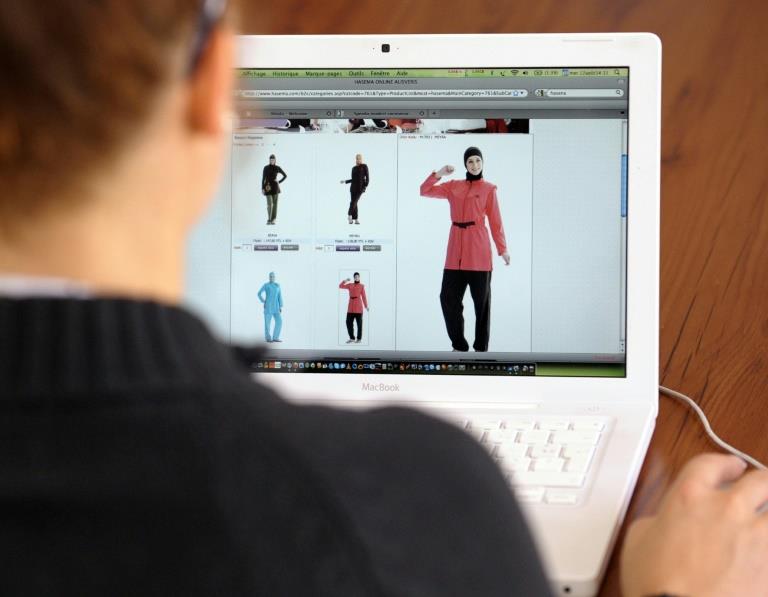
French minister compares veiled women to 'negroes who supported slavery'
Families minister Laurence Rossignol, sparked outrage on social media with her comment which came after former fashion mogul Pierre Berge lashed out at designers creating Islamic clothing and headscarves, accusing them of taking part in the "enslavement of women".
The businessman, partner of the late fashion legend Yves Saint Laurent, took aim at the wave of big fashion chains that have followed the Italian designers Dolce & Gabbana in catering specifically to the Muslim market.
Rosssignol, who is also responsible for women's rights, maintained she was referring to an abolitionist tract by the French philosopher Montesquieu, "On the Enslavement of Negroes", when she made her controversial comments to BFMTV and and RMC radio.
As she apologised for using the n-word, two leading French designers -- Agnes b and Jean-Charles de Castelbajac -- also came out strongly against so-called "modest" Muslim-friendly fashion.
"I am scandalised by it," Berge told Europe 1 French radio.
"Creators should have nothing to do with Islamic fashion. Designers are there to make women more beautiful, to give them their freedom, not to collaborate with this dictatorship which imposes this abominable thing by which we hide women and make them live a hidden life."
Rossignol admitted later to AFP that she had made "an error of language".
"But other than that... I don't take back a word," the socialist said.
- Modest clothing -
While France -- home of Europe's biggest Muslim population -- bans face-covering veils, some of its big fashion houses were among the first to tentatively embrace Muslim-specific style.
DKNY -- owned by French giant LVMH -- pioneered the "modest clothing" trend with a "capsule collection" aimed at the Middle East for the Muslim holy month of Ramadan two years ago.
But designer de Castelbajac, who has dressed singer Lady Gaga, said he had grave misgivings about the trend. "Fashion is secular and universal, and should bring hope."
Veteran feminist Agnes b had earlier vowed to "never do it. There is something obscene about offering clothes to rich women from countries where many are fleeing bombs trying to keep their veils on their heads.
"We should not normalise clothing which is significant in the way women are seen," she told the Parisien daily.
In January, Dolce & Gabbana became the first major western brand to directly aim at capturing a corner of the Islamic fashion market -- estimated to be worth $260 billion (230 billion euros) -- with its Abaya range.
Its collection of 14 abayas or ankle-length dresses, which it matched with embroidered headscarves and hijabs, was broadly praised at the time.
- 'Burqinis' -
The Swedish high street chain H&M followed their lead, using a veiled Muslim women in its advertising campaign, with the Japanese brand Uniqlo earlier this month announcing it would begin selling hijabs in its London stores.
The British brand Marks & Spencer has also put its toe in the water, marketing full-body "burqini" swimming costumes in its online store.
Last summer Zara, Tommy Hilfiger, Oscar de la Renta and Mango all launched varyingly "modest" collections to coincide with Ramadan.
But Berge, 85, who ran the Yves Saint Laurent fashion house for four decades, decried their "opportunism".
"These creators who are taking part in the enslavement of women should ask themselves some questions," he added.
"It is not because women are forced by their husbands to dress in that way that we too have to encourage it," he insisted.
"In one way they (the designers) are complicit, and all this to make make money. Principles should come before money," Berge argued.
"In life you have to chose the side of freedom," he said. Rather than covering women up, "we must teach (Muslim) women to revolt, to take their clothes off, to learn to live like most of the women in the rest of the world."

Legal Disclaimer:
MENAFN provides the
information “as is” without warranty of any kind. We do not accept
any responsibility or liability for the accuracy, content, images,
videos, licenses, completeness, legality, or reliability of the information
contained in this article. If you have any complaints or copyright
issues related to this article, kindly contact the provider above.


















Comments
No comment